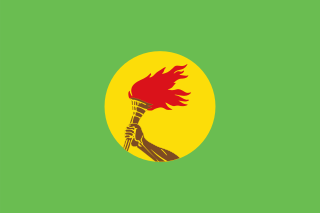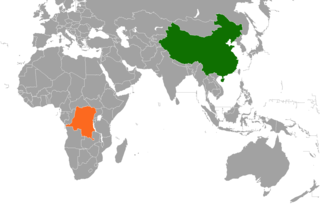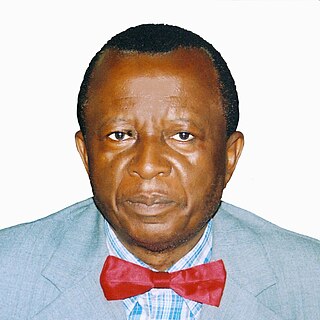Related Research Articles
The earliest known human settlements in what is now the Democratic Republic of the Congo have been dated back to the Middle Stone Age, approximately 90,000 years ago. The first real states, such as the Kongo, the Lunda, the Luba and Kuba, appeared south of the equatorial forest on the savannah from the 14th century onwards.

Politics of the Democratic Republic of Congo take place in the framework of a republic in transition from a civil war to a semi-presidential republic.

Zaire, officially the Republic of Zaire, was the name of the Democratic Republic of the Congo from 1971 to 1997. Located in Central Africa, it was, by area, the third-largest country in Africa after Sudan and Algeria, and the 11th-largest country in the world from 1965 to 1997. With a population of over 23 million, Zaire was the most populous Francophone country in Africa. Zaire played a central role during the Cold War.

Laurent-Désiré Kabila usually known as Laurent Kabila, was a Congolese rebel and politician who served as the third President of the Democratic Republic of the Congo from 1997 until his assassination in 2001.

The Democratic Republic of the Congo (DRC), also known as the DR Congo, Congo-Kinshasa, Congo-Zaire, or simply either Congo or the Congo, is a country in Central Africa. By land area, the DRC is the second-largest country in Africa and the 11th-largest in the world. With a population of around 105 million, the Democratic Republic of the Congo is the most populous Francophone country in the world. The national capital and largest city is Kinshasa, which is also the economic center. The country is bordered by the Republic of the Congo, Central African Republic, South Sudan, Uganda, Rwanda, Burundi, Tanzania, Zambia, Angola, the Cabinda exclave of Angola, and the South Atlantic Ocean.

Congolese music is one of the most influential music forms of the African continent. Since the 1930s, Congolese musicians have had a huge impact on the African musical scene and elsewhere. Many contemporary genres of music, such as Kenyan Benga and Colombian Champeta, have been heavily influenced by Congolese music. In 2021, Congolese rumba joined other living traditions such as Jamaican reggae music and Cuban rumba on UNESCO's "intangible cultural heritage of humanity" list.

Léon Kengo wa Dondo is a Congolese politician who served as the "first state commissioner" several times under Mobutu Sese Seko in Zaïre. He was one of the most powerful figures in the regime and was a strong advocate of economic globalization and free-market economics. He served as President of the Senate of the Democratic Republic of the Congo from 2007 to 2019.

The Second Congo War, also known as Africa's World War, the Great War of Africa, or the Great African War, began in the Democratic Republic of the Congo on 2 August 1998, little more than a year after the First Congo War, and involved some of the same issues. It began when Congolese president Laurent-Désiré Kabila turned against his Rwandan and Ugandan allies who had helped him come to power.

The Alliance of Democratic Forces for the Liberation of Congo-Zaire, also known by the French acronym AFDL, was a coalition of Rwandan, Ugandan, Burundian, and Congolese dissidents, disgruntled minority groups, and nations that toppled Mobutu Sese Seko and brought Laurent-Désiré Kabila to power in the First Congo War. Although the group was successful in overthrowing Mobutu, the alliance fell apart after Kabila did not agree to be dictated by his foreign backers, Rwanda and Uganda, which marked the beginning of the Second Congo War in 1998.

The First Congo War, also nicknamed Africa's First World War, was a civil war and international military conflict which lasted from 24 October 1996 to 16 May 1997 and took place mostly in Zaire, with major spillovers into Sudan and Uganda. The conflict culminated in a foreign invasion that replaced Zairean president Mobutu Sese Seko with the rebel leader Laurent-Désiré Kabila. Kabila's unstable government subsequently came into conflict with his allies, setting the stage for the Second Congo War in 1998–2003.
Ernest Wamba dia Wamba was a prominent Congolese academic and political theorist who became a commander of the Kisangani faction of the rebel Rally for Congolese Democracy during the Second Congo War.

The Constitution of the Democratic Republic of the Congo is the basic law governing the Democratic Republic of the Congo. The Constitution has been changed and/or replaced several times since its independence in 1960.

Antoine Gizenga was a Congolese (DRC) politician who was the Prime Minister of the Democratic Republic of the Congo from 30 December 2006 to 10 October 2008. He was the Secretary-General of the Unified Lumumbist Party.

The Army for the Liberation of Rwanda was a rebel group largely composed of members of the Interahamwe and Armed Forces of Rwanda. Operating mostly in the eastern regions of the Democratic Republic of the Congo along the border with Rwanda, it carried out attacks throughout the Second Congo War against forces aligned with Rwanda and Uganda. In 2000, the ALiR agreed to merge with the Hutu resistance movement based in Kinshasa into the new Democratic Forces for the Liberation of Rwanda (FDLR). ALiR was largely supplanted by the FDLR by 2001.
Societé minière de Bakwanga is a diamond mining company based in the Democratic Republic of the Congo. Historically, the company was the largest diamond producer in the world by volume. However, following decades of decline, the company currently produces only a small minority of the DRC's diamonds.

Lovanium University was a Catholic university in Kinshasa in the Belgian Congo. The university was established in 1954 on the Kimwenza plateau, near Kinshasa. The university continued to function after independence until it was merged into the National University of Zaire in 1971. It can be considered an antecedent of the University of Kinshasa.

The People's Republic of China (PRC) and the Democratic Republic of the Congo (DRC) have maintained diplomatic relations since 1961 and contacts between the two regions stretch back to 1887 when representatives of the Congo Free State established contacts with the court of the Qing dynasty. The first treaty between the two powers was signed in 1898.
The Truth and Reconciliation Commission was a truth commission which ran from July 2003 - February 2007 to investigate and promote national unity as a response to the atrocities committed in the war in the Democratic Republic of Congo between the Congolese army, Congolese rebels, and foreign insurgents.

Constantin Kasongo Munganga is a politician and monetarist from the Democratic Republic of Congo. He holds a Ph.D. in economics. In 2011, he was elected MP for the constituency of Katanda Territory, in the Kasai-Oriental province. He is the former Chief Executive Officer of the Center for Expertise, Evaluation, and Certification of Precious and Semi-Precious Mineral Substances, CEEC in short. Television audiences nicknamed him "The Man With The Red Knot" because of his appearance on media. Since 1975, he has taught at the Institut Supérieur de Commerce of Kinshasa.
André Kisase Ngandu was a Congolese rebel leader. An insurgent in the Simba rebellion of the 1960s, he immigrated to East and later West Germany where he lived for many years. He resumed his rebel activity with Ugandan support in the 1990s and emerged as leader of the National Council of Resistance for Democracy (CNRD) which waged an insurgency in eastern Zaire.
References
- 1 2 3 4 5 "Michigan State University Press Authors Biography for Jacques Depelchin". Archived from the original on 2010-06-30. Retrieved 2011-01-23.
- ↑ "AfricaFiles | "This war must end"". www.africafiles.org. Retrieved 2017-11-21.
- 1 2 Gana, Aaron Tsado; Samuel G. Egwu (2003). Federalism in Africa: The imperative of democratic development. Africa World Press. p. 34. ISBN 978-1-59221-080-0 . Retrieved 2 February 2011.
- ↑ Duke, Lynne (22 May 1995). "Congo Waits For List of New Rulers; Kabila's Government Still Unannounced". Washington Post. Archived from the original on July 17, 2012. Retrieved 2 Feb 2011.
- ↑ Fisher, Ian (13 Feb 2000). "Congo's War Overshadows Tribal Fight". The New York Times. Retrieved 2 Feb 2011.
- ↑ Depelchin, Jacques (2011-01-01). Reclaiming African History. Cape Town: Pambazuka Press. ISBN 9781906387983.
- ↑ From the Congo Free State to Zaire (1885-1974). Towards a Demystification of Economic and Political History at Google Books
- ↑ Depelchin, Jacques (2000-09-05). Silences in African History. Dar es-Salaam: Mkuki Na Nyota Publishers. ISBN 9789976973730.